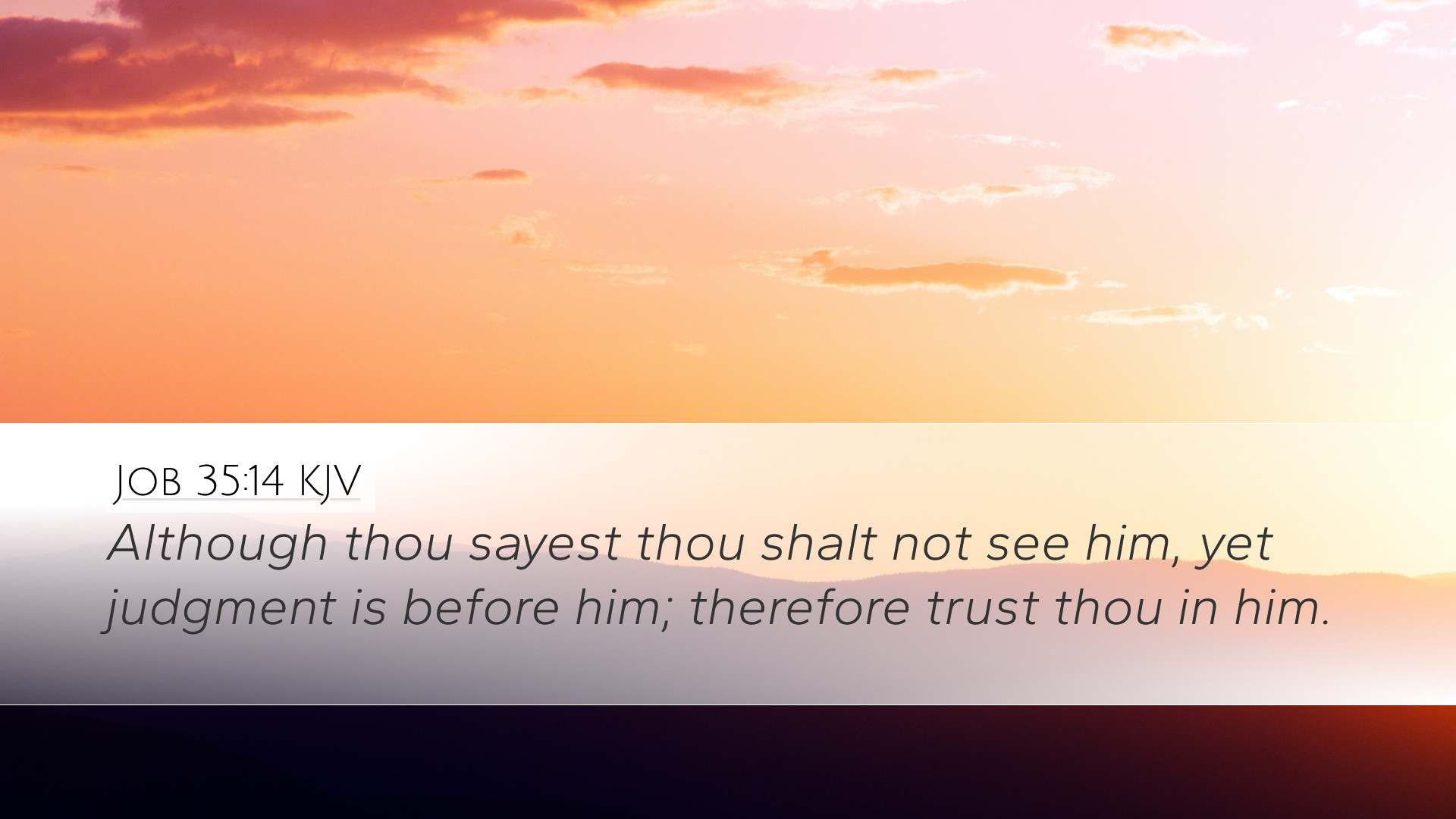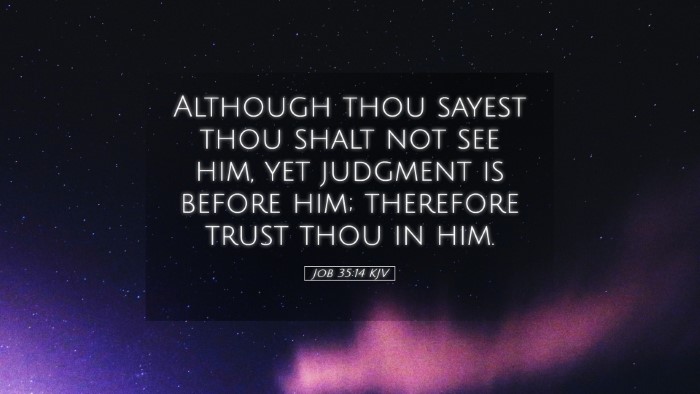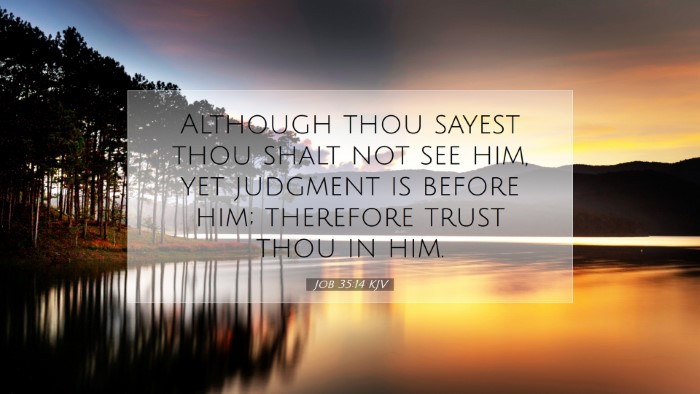Old Testament
Genesis Exodus Leviticus Numbers Deuteronomy Joshua Judges Ruth 1 Samuel 2 Samuel 1 Kings 2 Kings 1 Chronicles 2 Chronicles Ezra Nehemiah Esther Job Psalms Proverbs Ecclesiastes Song of Solomon Isaiah Jeremiah Lamentations Ezekiel Daniel Hosea Joel Amos Obadiah Jonah Micah Nahum Habakkuk Zephaniah Haggai Zechariah MalachiJob 35:14
Job 35:14 KJV
Although thou sayest thou shalt not see him, yet judgment is before him; therefore trust thou in him.
Job 35:14 Bible Commentary
Commentary on Job 35:14
Verse: Job 35:14 - "Although you say you do not see Him, yet justice is before Him, and you must wait for Him."
Introduction
The Book of Job is a profound exploration of suffering, divine justice, and human integrity. Job 35:14 presents a pivotal moment in the discourse, where Elihu reminds Job of God's justice and the necessity of faith in the face of unseen realities. This commentary seeks to draw insights from public domain commentaries by renowned theologians such as Matthew Henry, Albert Barnes, and Adam Clarke.
Contextual Analysis
Job, a righteous man, faced immense suffering and loss. His friends offered unhelpful advice, suggesting his misfortunes were a direct result of sin. Elihu, a younger figure in the narrative, offers a different perspective, emphasizing God's greatness and the importance of recognizing divine sovereignty.
Job’s Dilemma
Throughout the discourse, Job grapples with his desire to understand his suffering and God's apparent silence. Elihu's assertion that "justice is before Him" calls Job to acknowledge that God's ways are above human understanding, an important reminder for both Job and his audience.
Commentary Insights
Matthew Henry's Perspective
Matthew Henry emphasizes the vastness of God’s justice, pointing out that while humans may not always perceive God’s presence or understand His ways, we must trust in His eternal justice. Henry elaborates on the melancholic state of Job, who claimed he could not see God.
- Faith Over Sight: Henry asserts that faith must ascend above the circumstances of suffering. The unseen nature of God does not negate His presence or His justice.
- Awaiting God’s Justice: The requirement to "wait for Him" signifies patience and trust in divine timing, where justice is ultimately served in God’s perfect plan.
Albert Barnes' Insights
Albert Barnes notes that Elihu's arguments serve to reaffirm God's justice during human trials. Barnes reflects on the human tendency to question God’s moral governance in times of despair.
- Human Limitations: Barnes points out that human perception is limited and that God’s silence is not a sign of neglect but a component of His divine mystery.
- Justice Manifested: The notion of “justice is before Him” indicates that God's awareness of all events assures His eventual intervention and rectification.
Adam Clarke's Commentary
Adam Clarke provides a more theological exposition regarding the attributes of God, focusing on His omniscience and omnipotence. Clarke contextualizes the verse within the broader narrative of Job's quests for understanding.
- Divine Omnipotence: Clarke emphasizes that even when Job feels abandoned, God remains powerful and just in all matters concerning humanity.
- The Role of Suffering: Clarke signifies that suffering has a purpose—even if it does not become immediately apparent—pointing towards a grander narrative of redemption and growth.
Theological Implications
This verse invites deep theological reflection on the nature of faith amidst suffering. Elihu’s insistence on God's justice challenges the readers to comprehend God's workings beyond tangible acknowledgment.
- The Silence of God: The apparent silence of God can cause despair, but this verse reassures believers that divine justice is ever-present, even when not actively seen.
- The Nature of Waiting: Waiting for God is not passive; rather, it is an active, faith-filled stance that involves trusting in His character and promises.
Conclusion
Job 35:14 encapsulates a vital life lesson for believers: although God may seem distant during times of trial, His justice is unfailing, and patience in waiting for Him is essential. The insights from Henry, Barnes, and Clarke collectively encourage a deeper understanding of suffering and divine justice. This passage encourages pastors, students, and scholars alike to reaffirm their faith in God’s sovereign plan, reminding them that God’s ways, though mysterious, are just and ultimately redemptive.
Reflection Questions
- In what ways do you perceive God's silence in your own life?
- How can you cultivate a posture of waiting and trust during times of suffering?
- What does God's justice mean to you personally, and how does that affect your understanding of life’s challenges?


